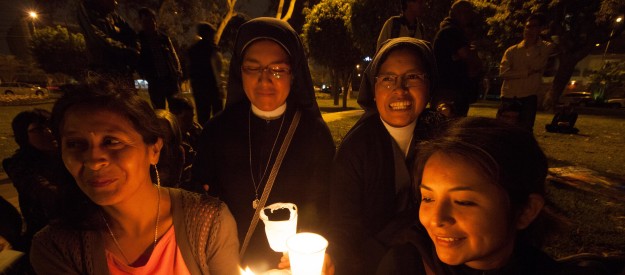"We are losing our attitude of wonder, of contemplation, of listening to creation and thus we no longer manage to interpret within it what Benedict XVI calls 'the rhythm of the love-story between God and man.'"
+ Pope Francis
COP and the Catholic Church

While another round of international climate discussions takes place in Lima, Peru, the world’s Catholics will be opening the week with Monday’s Feast of the Immaculate Conception.
This alignment is noteworthy.
After all, the Church will be adding her voice to the gatherings in Lima. And as always, she brings something more than science, politics, and policies.
The United Nations’ climate change conference will house a number of international working groups, including the “Conference of Parties” or “COP,” which will be meeting for its twentieth gathering since it formed in 1992. It was then that nations began signing on to an international treaty—the “United Nations Framework Convention on Climate Change”— to see what can be done to keep the planet’s average global temperature in check—or to respond to what might happen otherwise. Those that signed on to this agreement are the "parties" that make up the COP.
By 1995, participating nations saw (to varying degrees) the need to reign in carbon emissions. This led to the Kyoto Protocol, which binds developed countries to targeted emission reductions.
The Lima event will include the tenth meeting on the Kyoto agreement, as well as the forty-first sessions of the “Subsidiary Body for Scientific and Technological Advice” and the “Subsidiary Body for Implementation.” Also meeting, only for the second time, will be the “Ad Hoc Working Group on the Durban Platform for Enhanced Action.”
Catholics have already begun adding their say to these gatherings. More will be coming. Stay tuned for major headlines as this continues.
For now, Peru’s episcopal conference has issued a strong statement on the need to deal with climate change. And many lay faithful, religious, and clergy in Lima and elsewhere have joined marches and prayer events and they have fasted. The photo above is from an interfaith march in Lima as events opened.
Here in the United States, the Catholic Climate Covenant is ramping up its efforts as the global Church does likewise.
“The Covenant is working hard to make the most of Pope Francis's anticipated encyclical on the environment,” said executive director Dan Misleh. “As big as Pope Francis's heart is, his voice may get lost in our saturated media culture.”
To help get out the word on the Church, climate change, and ecology in general, Misleh and his team at the Catholic Climate Covenant are developing resources to help Catholics in the pews better follow the lead of the popes.
"Pope Francis stands in a long tradition of caring for the poor and for the planet,” Misleh added. “This tradition goes back to Genesis and is as recent as the World Day of Peace messages from St. John Paul II (1990) and Pope Emeritus Benedict XVI (2010). Pope Francis is encouraging us to recover ancient and vital teaching on the environment while highlighting the severe impacts of environmental neglect on poor people.”
Misleh said that the coalition is currently accepting donations to meet its $18,000 climate initiative goal. Prayer is also appreciated.
As stressed by Misleh and the bishops of Peru, the Catholic concern over climate change is rooted in its impact on people and communities that don't have the resources to respond to increased levels of storm surge, precipitation, and other effects.
The choice of Lima for this week’s COP meeting itself sends a message, Misleh said. Lima is “a city which itself is on the front lines of a warmer planet. Our vulnerable sisters and brothers in Peru and around the world are already suffering from more intense storms, longer droughts, and diseases brought on by these weather extremes. The outcomes for this meeting are critical and the negotiators must begin with an honest look at the situation of the poorest and most vulnerable.”
All this gets us back to the Immaculate Conception, which is a statement of faith about how Christ’s saving activity has no bounds. In saying that Mary benefited in this unique way from Christ’s power to save humanity, we acknowledge two important realities in our discussions of a changing climate:
The first is that there is such a thing called sin. While Mary was freed from this reality, the rest of us succumb to it again and again. There is self-interest in the human condition that leads to over consumption and protectiveness of consumption-based lifestyles. International gatherings and treaties—as necessary as they are—can’t solve all that ails us because they can’t overcome the brokenness of the human heart.
The second is that there is hope. That hope is Christ. Because of His life, death, and resurrection—because of the resulting grace of God that pours into human history—sin and its effects can be confronted. Human brokenness can be healed. With Christ, sin becomes virtue.
This is the message of the Church. It is a sorely needed one, too. Sharing this message is the work of so many people and organizations—like the Catholic Climate Covenant.
And so as world leaders and scientists convene in Lima, let us not forget how the week begins: in awe of the mystery of salvation. And with hope in Christ’s presence through the work of the Church in the world.
For now, stay tuned as events unfold.
Mary, Mother of God, pray for us.
St. Rose of Lima, pray for us.
Photo: Flicker/Our_Voices/Sean Hawkey/ LWF


















